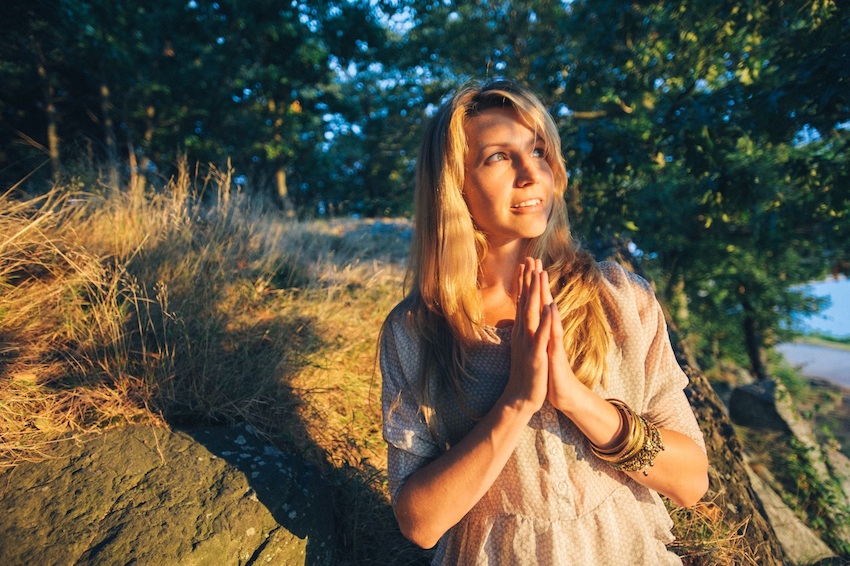Q&A: Therapeutic Yoga Instructor Kate Graham

Graham tries to “practice what she preaches” by taking time to practice yoga each week. Image by Korri Leigh Crowley.
With dozens of yoga studios around the Boston area, you can practice basically any type of yoga that you can dream up (think hip hop yoga, black light yoga, or even yoga with a live band). But while yoga sessions can be fun and relaxing, there are also principles of the practice that are being used for something that doctors call therapeutic yoga. Therapeutic yoga sessions are used to help patients who experience low back pain, migraines, depression, anxiety, and PTSD, among other things.
Kate Graham, a longtime yogi and a health clinician, started teaching therapy yoga five years ago. Now, through her company Soulful Yoga Therapy, she is one of the most prominent practitioners in the Boston area. She teaches individual sessions, classes at therapy centers, and even therapy yoga teacher training classes all over the city.
We sat down with the mental health guru to learn about what it means to take a therapeutic yoga class.
What is therapeutic yoga and how is it different from a regular yoga class?
Therapy yoga is basically yoga that empowers individuals to cultivate a deep sense of awareness and understanding of their own physical, emotional, and mental health. So using yoga techniques, I help students to accept where they’re at in the present moment, and then hopefully become empowered to transform and heal.
On many levels, therapy yoga is different from other types of yoga. When I’m offering a therapeutic yoga class, I hope to help set up a safe space for the student. I try to be mindful of what my clients need. I like to give people permission to take care of themselves during the practice, to listen to their bodies, to honor their bodies, and to do whatever they need to nourish and support themselves in the moment.
What types of students do you work with?
It ranges significantly. I worked early on with the Brookline Trauma Center and I ran trauma sensitive yoga groups for women with PTSD. I also work with individuals and do workshops for people who have anxiety and depression, or even for people who are looking for different ways to manage stress on a daily basis. I think often depression and anxiety can present as a mix; it’s never really as neat as we might expect it to be according to the diagnostic manuals. So I really work with anyone who is dealing with mental health issues in any way.
Why does yoga work when it comes to treating mental health issues?
Traditionally, the approach for mental health care has been medication and talk therapy. But I think we’ve neglected to recognize the role of the body in mental health care. Yoga gives us the opportunity to explore in our physical bodies what might be going on with our energy levels. The manifestation of depression, anxiety, or PTSD symptoms are often felt in the body, too.
For example, PTSD is often the fight or flight response of the body. Under stress, that response is kicked up into high gear. So while it’s helpful to use talk therapy, it’s also important to address the physical body in order to get better. It’s important to use breathing and meditation to find balance within the body and mind. That’s why yoga can be so powerful— it gives the power back to the individual. Yoga is something that you can use to empower yourself to find a sense of balance in a physical way.
How did you get interested in therapeutic yoga?
It was very intuitive to me. Many, many years ago I had my own struggles with depression and anxiety, and I found yoga to be a helpful tool that helped me find ways to manage that anxiety on a day to day basis. A lot of people have experienced that “I don’t know what it is, but I really love yoga” thing, and that happened to me. From there, I also had a love for counseling and being of service to people. So I went and got both my yoga teacher certification and my mental health counseling license.
I remember thinking, ‘In 5 years time, people are really going to start to get this therapy yoga thing’ and it’s been wonderful to be able to watch this area of therapy evolve. A lot of phenomenal leaders in the therapeutic yoga community are in Boston.
What are the best moments of teaching?
When people are able to internalize the practice and have their own breakthroughs within their practice, that is always incredible to watch and an honor to witness. Those moments are amazing.
What do you do when you’re not teaching yoga?
I try to practice yoga— I’m so busy that it’s fun to go take a class with someone awesome in the area. I’m a mental health clinician at Madison Park High School in Roxbury, too. And beyond that, I spend time with my family and try to be outdoors and enjoy my two-year-old daughter as much as possible. She keeps me pretty busy! My life is full, with my yoga and working as a counselor and weekend retreats; it’s fun. But just hanging out with the family, going out to dinner, and chilling out around Boston is really what I love to do when I’m not working. It’s hard because I love what I do so much that it consumes a lot of my time, because it’s where my heart is. Downtime is not much of a real thing in my life right now!


